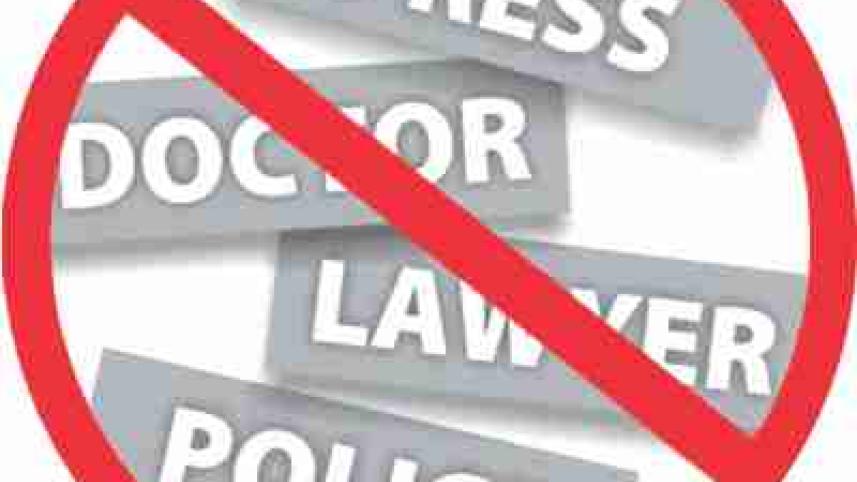Ban on stickers

On 4th May 2016, Dhaka Metropolitan Police Commissioner, Mr Asaduzzaman Mia made an announcement during a briefing session held at DMP media centre that DMP would not allow the use of stickers on vehicles identifying various professionals like press, police and lawyers. Only organisations can use painted logos on their vehicles. However, lawmakers and their families, employees of the Parliament and Parliament secretariat and its other departments can use stickers on their personal vehicles. DMP has also imposed a ban on the use of hydraulic horns in vehicles, and the use of tinted, black or colored glasses.
Undoubtedly it is very good initiative to control the use of hydraulic horns, as it creates intolerable noise. It is also understandable that the use of tinted, black or colored glasses should be controlled as in many cases, our law enforcers were unable to see crimes being committed or identify criminals in such vehicles because of it. Quite the reverse, I was rather dumbfounded after knowing DMP's reason for imposing such a ban on the use of professional stickers. The decision has been taken as criminals tend to commit and flee the crime scenes using vehicles with unauthorised stickers of press, police and lawyers. According to DMP, in many cases law enforcers even show flexibility to check such vehicles! This reason formulated few observations and one crucial question in my mind, which I am sharing below-
Firstly, nowhere in the 177 sections of our Motor Vehicles Ordinance 1983, it is stated that using professional stickers on private vehicles is an offence. However, according to Section 98, no person driving a motor vehicle shall allow any person to stand or sit or anything to be placed in such a manner or position as to hamper the driver in his control of the vehicle. Hence, a sticker should only be banned if it obstructs the view of the driver, but not solely because of it bearing any professional title. This standard is also followed in many of the European countries. Such as, in California (USA), stickers are permitted if they are a maximum 7-inch square, placed in the lower left corner of the windshield farthest removed from the driver, or a maximum 5-inch square placed in the lower corner of the windshield nearest the driver. Also in Alberta (Canada), a person may apply stickers to the window of a motor vehicle only if they do not limit the driver's field of vision or otherwise impair the safe operation of the motor vehicle.
Secondly, as a commonwealth country, we generally do not differ much from the laws of UK. In UK, a car sticker is prohibited under section 5 of its Public Order Act 1986, only if it displays any writing, sign or other visible representation which is threatening, abusive or insulting to the public in general. To my understanding, the use of professional stickers does not fall under these criteria, which Bangladesh should also follow as a commonwealth country.
Thirdly, it is completely a mystery to me that why would the law enforcers show flexibility (as per DMP) to check cars with stickers of press, police and lawyer. In the absence of any specific instructions from the higher authority or any express law from the parliament, showing such flexibility must amount to negligence. Hence, instead of banning the use of professional stickers on private vehicles, DMP should rather put emphasis on reminding the law enforcers about their obligations, and instruct them to check any vehicle which appears suspicious to them.
Fourthly, DMP should in fact insist all the professionals to use permanent professional stickers on their vehicles to be certain of their profession. By this way less people would be able to dodge the law enforcers by falsely using temporary professional stickers. Recently in UK, the Bradford Council passed a new rule effective from 1st January 2016, directing all private hire drivers to display permanent stickers on the side of their vehicles. Similar rules had already been in place in Leeds and other regions of UK too.
Finally, according to the Bangladesh Bar Council guidelines (Bangladesh Bar Council is a Statutory Autonomous Body of the Government constituted under the Bangladesh Legal Practitioners and Bar Council Order, 1972 (President's Order No. 46 of 1972)), I am entitled to introduce myself as an Advocate as soon as my name is entered in the roll of Bangladesh Bar Council.
Hence DMP's recent ban on professional stickers vividly conflicts with the Bangladesh Bar Council guidelines. Only because the law enforcers allegedly feel uneasy to check vehicles with certain professional stickers, should those persons refrain from expressing their own professional identity?
The writer is a Lecturer, Department of Law, East West University.



 For all latest news, follow The Daily Star's Google News channel.
For all latest news, follow The Daily Star's Google News channel.
Comments